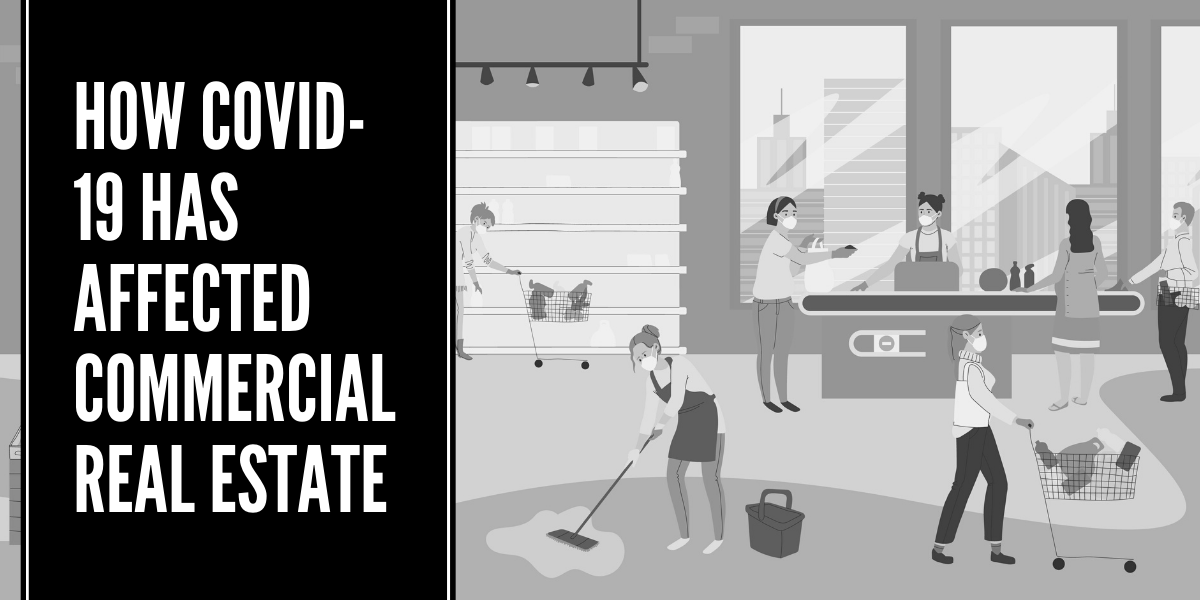How COVID-19 Has Affected Commercial Real Estate
From social distancing and increasing unemployment to government stimulus spending and stock market volatility, the COVID-19 pandemic has affected nearly every aspect of life in the last three months.
- How has it affected commercial real estate?
- What can sellers, buyers, landlords, and tenants expect as the economy reopens?
- Is commercial real estate still a solid investment?
For answers to these questions and more, we asked Nick Gustafson, CCIM and Gerald Teunissen for advice.
Van Essen: What can sellers or landlords who have seen decreased interest in their property during COVID-19 expect as the economy begins to reopen?
Gustafson: We don’t know what the future holds for many industries and specific businesses. It’s very encouraging to see local COVID-19 ordinances recently lifted by the city council. Now is the time to review list price points according to your broker’s market data to take advantage of new market enthusiasm while acknowledging buyers may be more conservative than they were prior to COVID.
Minor upgrades like paint and landscaping can go a long way—make sure the property is clean and ready for the next showing. If a seller is in a good position, it’s not necessary to jump at the first discounted offer that comes their way.

Nick Gustafson
Van Essen: How about for clients on the other side of the equation. What advice do you have for buyers or tenants who have been holding off on making a decision during this uncertain time?
Gustafson: It is our experience in previous market downturns that it takes 6-18 months for market wide repricing to take effect. If you are sitting on a significant amount of capital to invest, you most likely will have the privilege of watching some strikes at the plate over the next year. There are no callouts on strikes in this game. Be patient. That said, if the Midwest continues to reopen at this rate the downturn may be very short.
Van Essen: The stock market has been extremely volatile over the last three months. How has COVID-19 affected investment real estate?
Gustafson: Deals are still happening, but most investors are taking a wait-and-see approach. It’s frankly a little early to see what the new normal will be in cap rates and interest rates for the next year.
“I’m more bullish today as I’ve seen significant deal activity take place since mid-May compared to five weeks ago.”
-Nick Gustafson
Van Essen: Are you seeing differences in commercial real estate segments?
Gustafson: If I had to say at this moment, multifamily is looking like a winner. Investors are betting that regardless of how bad things get, our government will print enough money for unemployment checks to cover rent and groceries.
Retail is full of perceived risk, but that’s looking better and better. Office is an unknown, but I’m turning more bullish after personally being back in the office for the last two weeks and talking with clients who are doing the same.
Industrial is viewed better. Hospitality and leisure are struggling but improving.
Van Essen: One segment that doesn’t receive a lot of attention in commercial real estate circles but plays a big role in our state economy is ag. How has COVID-19 affected ag land?
Teunissen: Fortunately, the ag land market hasn’t seemed to be impacted too much by COVID-19. Most ag deals are done in the fall. A lot will change by then, so we’ll see how sales and rents will respond.

Gerald Teunissen
Van Essen: Smithfield and POET temporarily halting operation made headlines locally and nationally. How have you seen that affect the ag market?
Teunissen: Producers have been hit hard. When the processing plants shut down it sent a ripple effect up the food chain. Finishing cattle and hog producers’ cashflow evaporated. Producers further up the chain seem to be faring better because they can keep the animals longer by dialing back feed.
This spring has been great for crops, however. Crops are planted and the growing season has been solid so far. However, it’s yet to be seen how the government stimulus will affect the farmers.
Van Essen: What are your closing thoughts?
Gustafson: It needs to be said that the situation is extremely fluid. Governments, organizations and individuals are attempting to process the ongoing situation with little data and a constant flood of opinion that is often self-contradictory. Decisions and narratives change weekly if not daily. I was personally very concerned March through mid-May. I’ve turned bullish in a big way in the last two weeks.
Some businesses will do better than others in this new environment. Zoom is looking like a better business than United Airlines. Microsoft is doing better than the Cheesecake Factory.
At the end of the day, humans are resilient. After the Black Death ravaged Florence in the 1300s the Renaissance followed. World War II was followed by perhaps the greatest economic expansion in world history.
New businesses, innovations, methods and ideas will rise from our 2020 pandemic. It’s key for investors, governments, and companies to nurture the wave of innovation and ideas that will surely follow this pandemic.




